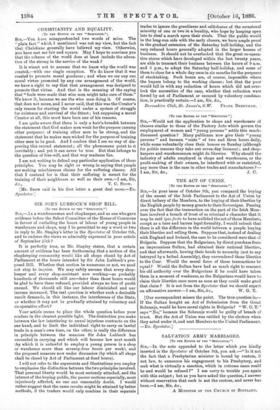THE ACT OF UNION.
[To THE EDITOR OF THE "SPECTATOR."] SIR,—In your issue of October 9th, you compared the buying of the assent of the Irish Parliament to the Act of Union by direct bribery of the Members, to the buying of their liberties by the English people by money grants to their Sovereigns. Passing over the fact that the transaction on the part of the Irish Mem- bers involved a breach of trust of so criminal a character that it may be said ipso facto to have nullified the act of those Members, except as a bare and barren legal formality, I would submit that there is all the difference in the world between a people buying their liberties and selling them. Suppose that, instead of dealing with England and Ireland, the case to be considered were that of Bulgaria. Suppose that the Bulgarians, by direct purchase from an impecunious Sultan, had obtained their national liberties, and that afterwards, bowing their heads to necessity (not to say betrayed by a bribed Assembly), they surrendered those liberties to the Czar. Would the moral force of those transactions be equal? Would the Sultan have had as much right to reassert his old authority over the Bulgarians if he could have taken them in a moment of weakness, as the Bulgarians would have to claim their liberties once more as soon as they could make good that claim It is not from the Spectator that we should expect
an affirmative answer.—I am, Sir, &c., W. G. T.
[Oar correspondent misses the point. The true question is,— If the Sultan bought an Act of Submission from the Great Sobranje, would he have moral rights in Bulgaria? "W. G. T." says "No," because the Sobrauje would be guilty of breach of trust. But the Act of Union was ratified by the electors when they acted under it, and sent Members to the United Parliament. —ED. Spectator.]


































 Previous page
Previous page